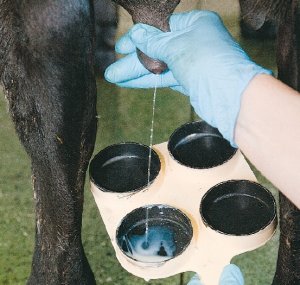Fifteen experts from seven European countries participated in a two-day workshop involving visits to typical farms and an exchange of expertise on the latest in mastitis control in Europe.
British dairy farming is mainly pasture based and rain quantity has a significant impact on grass growth and so on the quality and quantity of the main fodder for dairy cattle.
Despite the fact most herds calve year round, spring and summer milk production is increased up to 15%.
“Here, smaller as well as larger farms work profitably”, says Julie Macleod, market researcher at Dairy Co, a non-profit consultancy servicing UK dairy farmers. “Input and management are the decisive factors and farmers are flexible and react quickly to changes in the milk market.”
The bulk of the milk is processed as fresh liquid (50%) and as cheese (28%). During a visit to Robert Wiseman Dairies, Bridgewater, the EMP veterinarians saw how fresh milk is collected, processed and bottled daily. 500 million L of milk are bottled annually at this facility.
Effectiveness and sustainability are the main concerns of the company and as a result decisive measures are in place to reduce water, power and fuel consumption.
Since there is no public milk recording in the UK, veterinarian Dr James Breen works closely with the Quality Milk Management Service Laboratory. The EMP group visited the newly opened premises of Dr Andrew Bradley’s QMMS. Farmers can bring milk samples to the laboratory and get analysis results the following day, plus a veterinary interpretation of the data, giving information on the herd’s health status.
Also, the laboratory offers bacteriological culturing of milk samples and offers serological testing for para-TB (Johne’s disease). Bradley also offers software for veterinarians and farmers to find the causes of mastitis and fine-tune herd management measures.
Veterinarian Chris Hudson spoke about mastitis research in the UK.
The University of Nottingham is one of the most active institutes in this field doing many relevant studies. Adjacent to a campus shared with the agricultural faculty, the university also runs a dairy farm with 180 cows milked by robotic voluntary milking.
“Research conditions are very favorable here” says researcher Chris Hudson, one of a group overseen by Martin Green, Andrew Bradley and James Breen. All the scientists are somewhat involved in veterinary clinics.
















